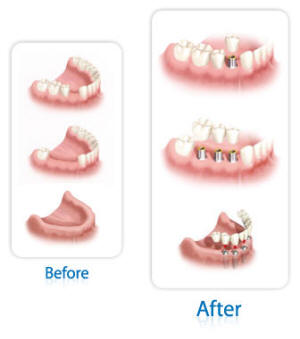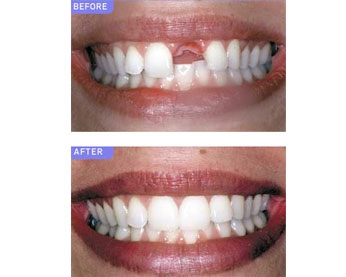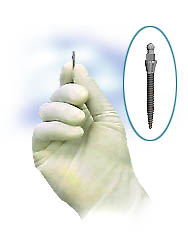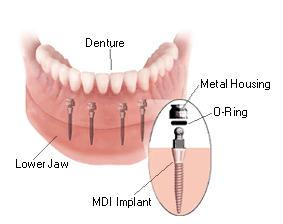Dental Implants 
Dental implants are a particular area of expertise at the Dr Ghassan's Dental Clinic. Our dentists have been thoroughly trained with some of the world's greatest experts and have completed hundreds of implant treatments successfully. We have everything we could possibly need to provide implants in a safe and caring environment. We utilise a dental CT scan. This allows us to avoid damage to important nerves in the jaws and to the sinuses. With the CT scanner we can tell before your implant visit whether your bone is suitable, instead of having to undergo a painful investigation under an aesthesia. All of our team from the receptionists to the dentists have undergone training in the USA and Germany. We firmly believe that everyone on the team needs to know about implants to be able to care for you as well as possible.  Dental Implants: Teeth That can Look and Feel Like Your Own 
What is a dental implant?A dental implant is an artificial tooth root that we place into your jaw to hold a replacement tooth or bridge. Dental implants are an ideal option for people in good general oral health who have lost a tooth or teeth due to decay, gum disease, an injury, or some other reason. While high-tech in nature, dental implants are actually more tooth-saving than traditional bridgework, since implants do not rely on neighbouring teeth for support. Dental implants are so natural-looking and feeling, you may forget you ever lost a tooth. You know that your confidence about your teeth affects how you feel about yourself, both personally and professionally. Perhaps you hide your smile because of spaces from missing teeth. Maybe your dentures don't feel secure. Perhaps you have difficulty chewing. If you are missing one or more teeth and would like to smile, speak and eat again with comfort and confidence, there is good news! Dental implants are teeth that can look and feel just like your own! Under proper conditions with diligent patient maintenance, implants can last a lifetime. What Dental Implants Can Do?Replace one or more teeth without affecting adjacent teeth.
Support a bridge and eliminate the need for a removable partial denture.
Provide support for a denture, making it more secure and comfortable. Types of Implants in Use Today Endosteal (in the bone): This is the most commonly used type of implant. The various types include screws, cylinders or blades surgically placed into the jawbone. Each implant holds one or more artificial teeth. This type of implant is generally used as an alternative for patients with bridges or removable dentures. Subperiosteal (on the bone): These are placed on top of the jaw with the metal framework's posts protruding through the gum to hold the prosthesis. These types of implants are used for patients who are unable to wear conventional dentures and who have minimal bone height. Mini-Implants: These are suitable for patients who want the most minimally invasive option. They are very useful for securing dentures in the mouth and reducing looseness. These are the most affordable dental implants and the cost is often completely covered by insurance companies. Advantages of Dental Implants Over Dentures or a BridgeEvery way you look at it, dental implants are a better solution to the problem of missing teeth. Cosmetic: Dental implants look and feel more like your own teeth. Since dental implants integrate into the structure of your bone, they prevent the bone loss and gum recession that often accompany bridgework and dentures. No one will ever know that you have a replacement tooth. Tooth-saving: Dental implants don't sacrifice the quality of your adjacent teeth like a bridge does because neighboring teeth are not altered to support the implant. More of your own teeth are left untouched, a significant long-term benefit to your oral health. Confidence: Dental implants will allow you to once again speak and eat with comfort and confidence! They are secure and offer freedom from the irksome clicks and wobbles of dentures. They'll allow you to say goodbye to worries about misplaced dentures and messy pastes and glues. Reliable: The success rate of dental implants is highly predictable. They are considered an excellent option for tooth replacement. Are You a Candidate for Dental Implants?The ideal candidate for a dental implant is in good general and oral health. Adequate bone in your jaw is needed to support the implant, and the best candidates have healthy gum tissues that are free of periodontal disease.
Dental implants are intimately connected with the gum tissues and underlying bone in the mouth. What Is Treatment Like?This procedure is a team effort between you, your dentist and the restoring dentist. Your dentist will consult with you to determine where and how your implant should be placed. Depending on your specific condition and the type of implant chosen, your dentist will create a treatment plan tailored to meet your needs. Replacing a Single ToothIf you are missing a single tooth, one implant and a crown can replace it. A dental implant replaces both the lost natural tooth and its root. Replacing Several TeethIf you are missing several teeth, implant-supported bridges can replace them. Dental implants
will replace both your lost natural teeth and some of the roots. You are better off getting as many implants as possible to replace your missing teeth. If you do
too large a bridge on too few implants the implants may be overloaded and fail. Replacing All of Your TeethIf you are missing all of your teeth, an implant-supported full bridge or full denture can replace them. Dental implants will replace both your lost natural teeth and some of the roots. Sinus Grafting:A key to implant success is the quantity and quality of the bone where the implant is to be placed. The upper back jaw has traditionally been one of the most difficult areas to successfully place dental implants due to insufficient bone quantity and quality and the close proximity to the sinus. Sinus grafting can help correct this problem by raising the sinus floor and developing bone for the placement of dental implants. This is a routine procedure which is commonly done prior to implants in the back of the mouth. Ridge ModificationDeformities in the upper or lower jaw can leave you with inadequate bone in which to place dental implants. To correct the problem, the gum is lifted away from the ridge to expose the bony defect. The defect is then filled with bone or bone substitute to build up the ridge. Ridge modification has been shown to greatly improve appearance and increase your chances for successful implants that can last for years to come What Can I Expect After Treatment?As you know, your own teeth require conscientious at-home oral care and regular dental visits. Dental implants are like your own teeth and will require the same care. In order to keep your implant clean and plaque-free, brushing and flossing still apply. After treatment, your hygienist will work closely with you and your dentist to develop the best care plan for you. Periodic follow-up visits will be scheduled to monitor your implant, teeth and gums to make sure they are healthy. 
Time frame:The most common way implants are planned is in a 2 stage approach. This means the implants (man-made roots) are placed under the gum and buried for a few months. After healing (while you can continue to wear your denture), the implants are exposed and provisional teeth are made. Once the gum has matured the final teeth can then be made. If you have needed some extra treatment such as grafting this may mean we have to wait a little longer for uncovering of the implants. Mini Implants:Mini implants consist of a miniature titanium implant that acts like the root of your tooth and an O-ring that is incorporated into the base of your denture. This makes your denture much more stable and stops it coming out at embarrassing times. It allows small movements of the denture but will not allow the denture to fall out unless you want to remove it. It allows you to chew all sorts of foods again that you may not have had in years such as steaks and even chewing gum!! 
Is the Mini Dental Implant safe?Yes. The FDA granted its formal consent to market the Mini Dental Implant device as a long-term item. As they are so small they are very gently placed and so cause very little discomfort. They are regularly placed in people of advanced age as they are so gently placed. When can Mini Dental Implants be used? Mini implants can function as long-term supporting structures. In fact, some have been successfully functioning in patients' jaws for several decades. In the past several years, some clinicians have been using MDI's for single tooth replacements and in crown and bridge cases. We only use them for making dentures more stable where they have the highest success rate. What's the primary use for Mini Dental Implants? The most effective use of this unique dental product is securing a lower denture. There are millions of people worldwide who are lacking teeth who struggle daily with loose teeth. The most effective use of this unique dental product is securing a lower denture. There are millions of people worldwide who are lacking teeth who struggle daily with loose teeth.
A majority suffer a great deal of discomfort as a result of lose or ill-fitting dentures. Many denture wearers simply withdraw from any type of social engagement as a result of being compelled to wear them. Successful placement of the Mini Dental Implant addresses and solves all of these social and practical problems. Denture patients all over the world have experienced relief from loose or ill-fitting dentures with MDI`s. Uniquely, the MDI can be utilized to stabilize a denture in a couple of hours at the Dr Ghassan's Dental Clinic with the patient leaving the clinic with a stabilized prosthesis.
How can Mini Dental Implants help denture wearers?Mini dental implants are placed in a painless procedure and requires only a mild local aesthetic. The mini dental implants, which are approximately the size of wooden toothpicks, are placed about five millimetres apart. The patient's denture is then carefully adjusted to allow it to snap onto the four mini implants. The result? A tight fitting, completely reliable system that allows a patient to speak and eat with confidence. The Mini Dental Implants are placed in about an hour. Because of the unique, minimally invasive procedure, the minute size of the implants, and where they are placed, the typical Mini Dental Implant patient can enjoy a light meal an hour or so after having the mini implants placed. Further, a denture patient who has had his or her prosthesis stabilized with MDI can remove and replace the denture easily after a little practice, and can easily utilize good dental hygiene. All in all far superior to suffering from a loose denture. How much do these mini-implants cost?The cost varies depending on the size and number and complexity of the case. If you are covered by an insurance company you will often be entitled to get the treatment completely free of charge. Mini-implants cost less than regular implants generally and are a very inexpensive way to secure a denture. Our usual charge is only QR 4500 per implant of this type. How can these tiny Mini Dental Implants withstand the forces from chewing? Mini implants are made from titanium alloy which is extremely strong and grows well to human bone. If the bone is adequate to take the implants they are usually well able to take chewing. Mini implants are made from titanium alloy which is extremely strong and grows well to human bone. If the bone is adequate to take the implants they are usually well able to take chewing.
Like everything in the body there are cases of failure or fracture, however these are rare.
Why should I get mini implants done at the Dr Ghassan's Dental Clinic?We have been placing mini dental implants (and regular implants) for years and have a great deal of experience and education in the area. We have changed many people's lives with these remarkable devices. If you would liketo talk to someone who has been through the process we are very happy to pass their details onto you to talk with them directly. Dental clinic in Qatar, dental clinic Qatar , Doha. Dr Ghassan dental clinic in Qatar Doha provide dentist and hygienist care. Amalgam Dental filling, white dental filling are provided by drilling or by dental laser. The dentist Dr Ghassan use white tooth dental filling. White teeth filling and white tooth filling are better than amalgam tooth filling. Cosmetic dentist and cosmetic dental appearance is better with white tooth filling than amalgam tooth filling. Dental Bridge, dental crowns, dental veneers are part of cosmetic dentistry. Cosmetic dentistry gives better smile teeth. Dental lasers are speciality of the clinic. Dental diode 980nm is used by the dentist in Doha Qatar clinic. Dentistry has come a long way since the days of painful extractions without anaesthesia. Today, laser technology, porcelain and r esin composite fillings, and better patient management have improved the image of the dentist, and have lessened the usual anxiety and fear most people feel facing the dreaded dental drill. Amalgam Fillings, white fillings and root canal treatment. Dental X-Ray and dental xray with dental ct scan. Periodontal and gum disease treatment. Crowns metal or non metal crowns. Metal dental Bridges and non metal dental bridges. Dental Filling (Composite), Dental Filling (Casted Chrome-Cobalt, Dental Filling (Casted Gold) and tooth coloured dental Filling (White Inceram) are available. Metal Crowns, Non-Precious Metal Crowns, Precious Metal Crowns, Inceram Crowns with no metal, Zircon Crowns, and the Da Vinvi aesthetic Crowns, Da Vinci Veneers. Endodontic also known as R oot Canal Treatment for Incisal teeth, Premolar teeth, Molar teeth with Laser Treatment for pain free dentist treatment and dentistry. Teeth and tooth Extraction performed at the clinic. Simple tooth extraction, Semi-Surgical or Surgical tooth Extraction with total anaesthesia covers for pain free dental procedure in this Qatar dental clinic Doha. Gingivectomy, Perinectomy, gum biopsy and treatment for Impacted Wisdom Tooth are offered in this dental clinic Doha Qatar. Teeth whitening and tooth whitening either use at home tray type or Whitening dentist Chair-Side, tooth whitening and teeth whitening with Britesmile ot Zoom tooth whitening. Dental implant, mini implants and dental braces are offered. 6 month dental braces and invisible dental braces invisilign are one of the best dental braces available. Also offer Periodontal Treatment Pocket Curettage and Swab & Culture and treatment for dental abscess and gingivitis management. |